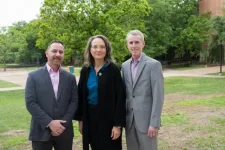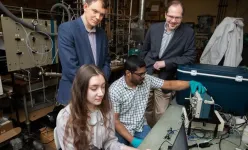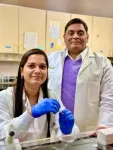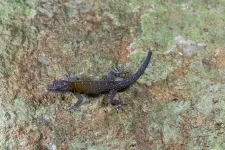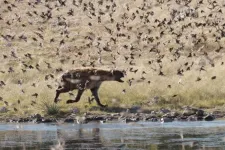(Press-News.org) Rice University’s Emerging Scholars Program (RESP) has received a five-year, $2.5 million grant from the National Science Foundation. The funding aims to bolster achievements in science, technology, engineering and mathematics (STEM) among students from under-resourced families and communities.
The grant will enable RESP to expand its reach and impact, offering increased support to its scholars via summer tuition scholarships, housing subsidies and research stipends. The number of scholars in the program will increase from 40 to 50 in Summer 2024 and to 60 in Summer 2025.
“Rice recognizes the challenges faced by students from low-income backgrounds,” said Angel Martí, chair and professor of chemistry, faculty director of RESP and principal investigator of the grant. “RESP aims to empower these students to achieve their academic and professional aspirations as future scientists and engineers.”
About 20% of Rice’s undergraduate population comes from families with limited financial resources with 12% being first-generation college attendees. These students often have less exposure to advanced math and science curricula in high school and encounter barriers to accessing essential resources vital for college success, making them more vulnerable to academic distress and attrition than their more affluent peers. They also face hurdles due to a lack of mentoring and guidance, according to experts.
“The grant will allow RESP, which sets the standard for supporting student success, to conduct high-quality research, findings from which we will disseminate broadly,” said Margaret Beier, professor and chair of psychological sciences and co-principal investigator on the grant. “What an amazing opportunity to impact student success in STEM within and beyond the hedges.”
RESP addresses disparities by providing an academic initiative tailored to assist students in adapting to the challenging pace, depth and rigor of the STEM curricula at Rice.
The program, which combines a six-week summer bridge program with ongoing personalized mentoring and support throughout the college journey, was established in 2012 by Professor Emeritus of Mathematics Mike Wolf and Senior Associate Provost Matthew Taylor. The latter is also a co-principal investigator on the grant.
“Low-income students, especially those who are first-generation, face unique obstructions to pursuing college STEM degrees,” Taylor said. “RESP and Rice University are committed to eliminating these obstructions and ensuring that all students have the opportunity to thrive and achieve their academic and professional aspirations.”
Through initiatives like RESP, Rice continues its commitment to fostering diversity, equity and excellence in STEM education.
This grant (No. 2322771) is administered by the National Science Foundation Division of Undergraduate Education. The content in this press release is solely the responsibility of the authors and does not necessarily represent the official views of the National Science Foundation.
END
Rice Emerging Scholars Program receives $2.5M NSF grant to boost STEM education
2024-03-28
ELSE PRESS RELEASES FROM THIS DATE:
Virtual rehabilitation provides benefits for stroke recovery
2024-03-28
A stroke often impacts a person’s ability to move their lower body from the hips down to the feet.
This leads to diminished quality of life and mental health in addition to increased susceptibility to falls. But now, UBC Okanagan researchers are exploring new treatment methods to help bridge the service delivery gap, and recovery outcomes, for patients after a stroke.
“Shortened length of inpatient stays and continued challenges in transitioning back to the community—including poor access to continued stroke rehabilitation services—have resulted in substantial unmet recovery needs,” ...
Generative AI develops potential new drugs for antibiotic-resistant bacteria
2024-03-28
With nearly 5 million deaths linked to antibiotic resistance globally every year, new ways to combat resistant bacterial strains are urgently needed.
Researchers at Stanford Medicine and McMaster University are tackling this problem with generative artificial intelligence. A new model, dubbed SyntheMol (for synthesizing molecules), created structures and chemical recipes for six novel drugs aimed at killing resistant strains of Acinetobacter baumannii, one of the leading pathogens responsible for antibacterial resistance-related deaths.
The researchers described their model and experimental validation of these new compounds in a study published March 22 in the journal ...
Biofuels could help island nations survive a global catastrophe, study suggests
2024-03-28
A major global catastrophe could disrupt trade in liquid fuels used to sustain industrial agriculture, impacting the food supply of island nations like New Zealand that depend on oil imports.
A new study in the journal Risk Analysis suggests that New Zealand and other island nations dependent on imported fuel can plan for future emergencies by stepping up their production of biofuel from locally grown crops (like canola) and farming more fuel-efficient crops (like wheat and potatoes rather than dairy).
In the event of a major disruption in liquid fuel imports, results showed that New ...
NJIT research team discovering how fluids behave in nanopores with NSF grant
2024-03-28
A research team from New Jersey Institute of Technology is uncovering mysteries surrounding fluids in nanoporous materials, and has been recently awarded a grant from the National Science Foundation (NSF) to support this research.
The research is focused on the elasticity, or compressibility, of fluids in these nanopores. Understanding the elastic properties of fluids has significant implications across multiple disciplines. Engineering applications, geological exploration, materials science and environmental studies ...
New study shows association of historical housing discrimination and shortfalls in colon cancer treatment
2024-03-28
BIRMINGHAM, Ala. – A nationwide study of 196 cities shows that housing discrimination from 90 years ago still casts a historical shadow of inequities in colon cancer care today, S.M. Qasim Hussaini, M.D., of the University of Alabama at Birmingham and colleagues at the American Cancer Society and Johns Hopkins School of Public Health report in the journal JCO Oncology Practice.
In the 1930s, the federally sponsored Home Owners’ Loan Corporation, or HOLC, used racial composition to map out residential areas worthy of receiving mortgage loans and those areas to avoid. Neighborhoods ...
Social media use may help to empower plastic surgery patients
2024-03-28
Waltham — March 28, 2024 — For patients considering or undergoing plastic and reconstructive surgery (PRS) procedures, using social media to gather information and answer questions can enhance patient empowerment – potentially leading to increased autonomy and better decision-making, reports a study in the April issue of Plastic and Reconstructive Surgery®, the official medical journal of the American Society of Plastic Surgeons (ASPS). The journal is published in the Lippincott portfolio by Wolters Kluwer.
"Our study suggests that connecting to social media is associated with meaningful increases in empowerment for PRS patients, ...
Q&A: How to train AI when you don't have enough data
2024-03-28
Artificial intelligence excels at sorting through information and detecting patterns or trends. But these machine learning algorithms need to be trained with large amounts of data first.
As researchers explore potential applications for AI, they have found scenarios where AI could be really useful — such as analyzing X-ray image data to look for evidence of rare conditions or detecting a rare fish species caught on a commercial fishing boat — but there's not enough data to accurately train the algorithms.
Jenq-Neng Hwang, University of Washington professor of electrical and computer and engineering, specializes in these issues. ...
Wayne State University researchers uncover potential treatment targets for Zika virus-related eye abnormalities
2024-03-28
DETROIT - A groundbreaking study published in the journal iScience presents crucial insights into the ocular effects of Zika virus infection during pregnancy and offers promising avenues for therapeutic intervention.
Produced by a team of researchers in the Department of Ophthalmology, Visual and Anatomical Sciences at the Wayne State University School of Medicine, the paper, “Targeting ABCG1 and SREBP-2 mediated cholesterol homeostasis ameliorates Zika virus-induced ocular pathology,” provides compelling evidence of the ...
Discovering Van Gogh in the wild: scientists unveil a new gecko species
2024-03-28
You’ve probably seen nature depicted in art, but how often do you see an artwork hiding in nature?
When they saw the back of a lizard in the Southern Western Ghats, a group of scientists from the Thackeray Wildlife Foundation in India were reminded of Van Gogh’s The Starry Night. As soon as they figured out it was a new species, it was only apt to name it in honour of the famous painter.
“Cnemaspis vangoghi is named for Dutch painter Vincent Van Gogh (1853–1890) as the striking colouration of the new species is reminiscent of one of his most iconic paintings, The ...
Small birds spice up the already diverse diet of spotted hyenas in Namibia
2024-03-28
Hyenas are generalist predators (and scavengers) with a broad range of prey species. They are known for hunting (or scavenging) larger mammals such as antelopes and occasionally feed on smaller mammals and reptiles. Being flexible in the choice of prey is a strategy of generalists – and this even extends to small passerine birds, as scientists from the Leibniz Institute for Zoo and Wildlife Research (Leibniz-IZW) and the University of Ljubljana observed in Namibia: Spotted hyenas pursued red-billed queleas, picked them from the ground or the surface of a waterhole and swallowed them whole, at a success rate of approximately one bird every three minutes. These observations were described ...
